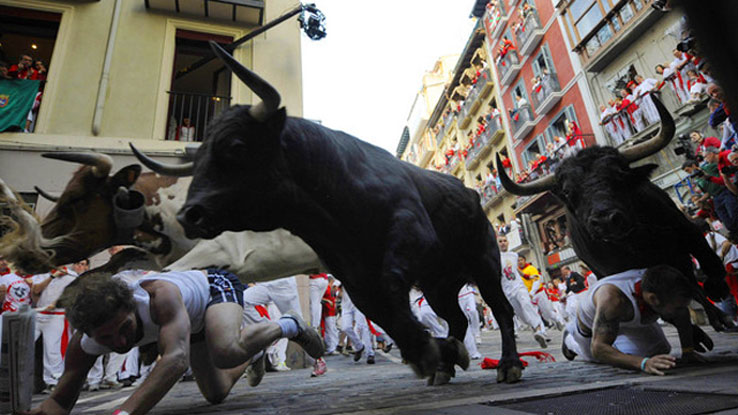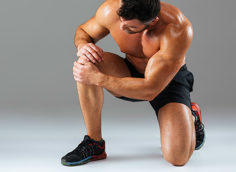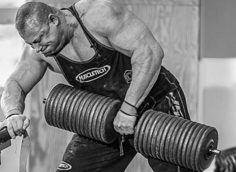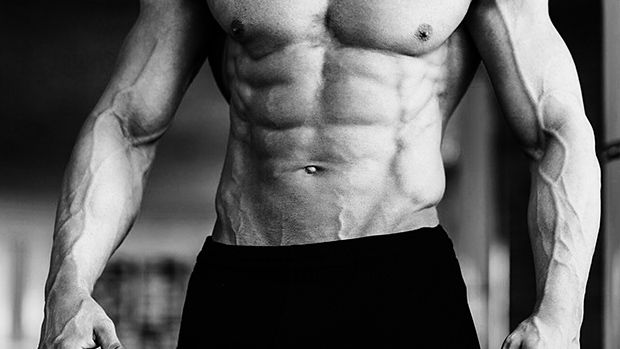"Life is a marathon, not a sprint."
Whenever I hear that little nugget of cheese-ball inspiration, I want to throw up, because it's usually said by some sloth that never reached his goals and he's just trying to make sure you stay in no rush to reach yours.
I don't know when exactly sprinting through life and achieving one goal after the next became a bad thing, but have no fear, I'll address humanity's aversion to sprinting throughout this article.
Our solar system hurtles around the galaxy at 450,000 mph, so our time here on this rock we call Earth (which is circling the sun at 70,000 miles an hour), in comparison to eternity is less than a blink of an eye.
The way I see it, life is an all-out sprint – and we should attack it that way.
So then what's with the distance approach to cardio? I hear people say all the time that they entered a 10k or a marathon to get "in shape." Is that so? I'm tempted to have these folks stand in front of a full-length mirror and ask them what shape were they looking for exactly?
If it's extra slender, pencil-necked, and endomorphic, then I'll condone the distance work. If they say, however, that the shape they seek is lean, muscular, and mesomorphic, then they're barking up the wrong tree.
Furthermore, if I have one more distance-junkie proudly brag about the doctor visits, MRIs, or therapy they're using to recover from their jogging or ultra-marathon, I'll be forced to buy a big bat and carry it with me.
You're proud of being injured, huh? So if I smack you in the knees with the bat and produce an injury, are you still proud? Or then are you just a masochist? Maybe such drastic measures are what it takes for you to realize that pain doesn't equal productivity, and that you've been chasing the wrong dog – and way too slowly at that.
Enjoyment Versus Results
I understand that (unfortunately) many of us need something to drive us and get us moving besides the ultimate fact that training will help you live longer. And I understand that some people may simply enjoy distance jogging and/or be genetically suited for this style of training. I'm not here to argue either of those things.
The purpose of this article is to argue in favor of the benefits of sprinting. And interestingly enough, whether you like jogging or are naturally skinny or slow, you can still benefit from this all-powerful training medium.
Don't think we need this argument? Then explain why most people stop sprinting by high school. Explain why most parents tell their children to stop running and slow down.
Plain and simple, besides the Olympic 100-meter final, sprinting gets much less love than distance work. Whether it's the marketing of jogging gear, the social aspect of distance events, or the fact that "No Pain, No Gain" is imbedded into the average training psyche, you're sure to see more people walking and jogging at your local track than to see them sprinting short portions of it, resting, and repeating.
In a world slowly being taken over and dominated by brightly colored equipment tools and fancy programming, we've forgotten to use the most important piece of equipment we were given, our body. And we've definitely forgotten to use it the way it was designed – to sprint.

Why Do We Run Marathons?
In Train Like a Man Part 4, I suggested that if Baron Pierre de Coubertin loved American folklore instead of Greek tragedy, perhaps we'd have millions of people lining up to test themselves in the 100 meter instead of 26 miles.
If our hero was a steel drivin' sprinter, rather than a solitary noncombatant whose chosen pursuit literally ran him – and millions of poor souls centuries later to follow – into the ground, just perhaps the world and its view of fitness would be different.
In all the emails I've ever received, I don't think I've ever received anything from a recreational athlete telling me they're entering a 100-meter dash.
Why? Because it's not okay to suck in a sprint.
If you jog – especially if you enter a marathon – it's okay to be mediocre. By contrast, it's decidedly not okay to suck at sprinting.
Show up to an actual race and take thirty seconds to run 100 meters and you're absolutely exposed for the world to see. Suck at sprinting in the wild, and you're somebody's dinner.
Suck at the marathon, on the other hand, and they'll hand you a juice box and a medal, even if you come in last.
The Paleo Idea
Add speed and power to any movement and the body changes. Look at a sprinting athlete versus a distance athlete. Large, developed muscles are the norm on just about any athlete involved in sprinting.
So why does this happen? You could cite the activation of the larger fast twitch fibers in sprinting or how cutting weight and losing muscle improves distance performance, but what about the "why" behind how sprinters look leaner and more muscular from seemingly much less work?
I have an interesting theory using the popular Paleo concept.
No one thinks twice about applying the Paleo concept to eating, but what about its application to movement? In terms of body development, sprinting is the ultimate Paleo exercise – and perhaps many of the problems we face today as a society are because this movement is no longer used during most peoples' daily routine.
(Granted, like all Paleo arguments, this is mere speculation. Were we meat eaters or vegetarians? Were we distance runners or sprinters? Until we invent a time machine, we'll just continue to enjoy the brainstorming and debate, but it's still interesting to speculate.)
The TFW Lock-And-Key Mechanism of Sprinting
When I address groups of people, I ask them if they think ingesting 1000 calories of junk food has the same effect on the body as ingesting 1000 calories of fruits and vegetables.
Without fail, according to the Paleo dogma, every attendee answers the same way – they believe that a calorie isn't just a calorie. So in terms of energy intake, most people agree that due to the way the human body was designed and has evolved, there are particular foods that can act as keys and unlock specific pathways to either promote health (muscle gain, fat loss, etc.), or allow detrimental effects (diabetes, cancer, heart disease) when those proper pathways aren't accessed.
Well if we can all agree on energy intake, I'm confused why people rarely discuss caloric output in the same manner? If there's an optimal input mechanism of calories to achieve optimal health, what about an optimal output mechanism?
If muscle growth, fat loss, and health are what you're after, I argue that sprinting may be the key that no one's using – because those thousand calories you're burning when you jog aren't nearly the same as when you burn them off at a sprint. Not even close.
That's because when you jog, you're not using your body the way it's designed to be used. That's what sprinting is for. I mean, why have an Achilles tendon if we're supposed to run on our heels? Why have huge glutes if we're supposed to simply jog monotonously and see how long we can last?
Is the reason we have big traps because we're supposed to act as perpetual motion machines for the better part of five hours at a time? And why the hell are our quads so big if we're just supposed to pound them with muscle-eating eccentrics from jogging? It makes no sense to me, and it shouldn't make any to you, either.

Sprinting: The Real Measure Of Fitness
Distance jogging makes your lifts go down. Your muscle mass decreases and you have to accept it. On the other hand, sprinting mandates that you get your numbers higher to complement it.
To lower your marathon time, you need to get out and log miles, cut weight (including muscle), and get ready for pain. To lower your time in the 100-meter sprint you need to get strong, pack on muscle, lose fat, and get in some explosive, technical workouts.
So if you want to run faster, you have to do a few things:
- You have to increase your relative body strength, so you have to get stronger for the amount you weigh. You can accomplish this by adding muscle or losing fat, or both.
- You have to improve your sprint technique. This will be done through technical work, which will improve coordination. Here you may recognize specific areas in which to improve strength while developing muscular endurance specific to sprinting. And this is where my next article will focus.
So, to review, sprint training involves improvements in speed, strength, diet, endurance, coordination, and flexibility. Sounds a whole lot like fitness to me. To top it off, sprinting will also help any marathon runner. Too bad the opposite isn't true.
But before you fans of distance running fire off your emails defending your chosen sport, I'm not saying that elite distance athletes aren't impressive in terms of time Ð I'm saying they're usually not impressive in terms of physique.
A guy that can run an under 5-minute mile pace for 26 miles is impressive in ability, no doubt, but he's probably not concerned with having bigger arms or legs, or is even reading T Nation for that matter.
My Train Like a Man articles are for guys concerned about building mass, getting strong, and being able to clean clocks. And if I have to scrap, I'll choose to battle the jogger over the sprinter every time.
Now that I've made a case for sprinting, Train Like a Man 6 will cover one of the muscle groups that will benefit most from this exercise.





